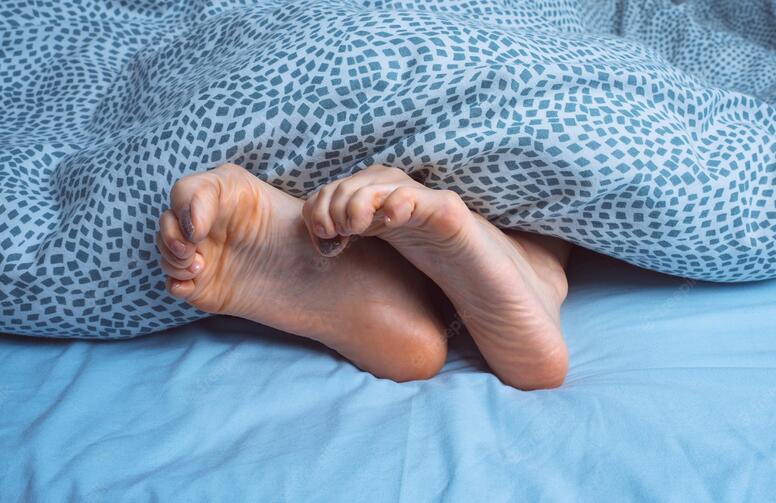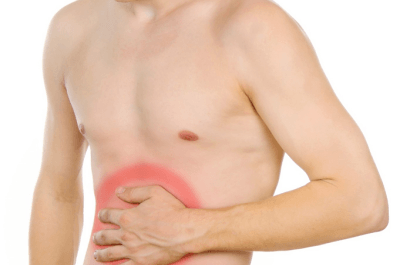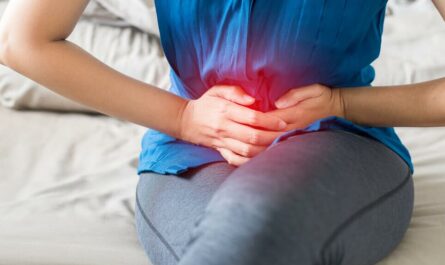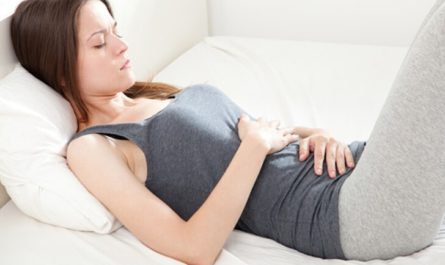Leg cramps are sudden, involuntary contractions of the muscles in the leg. They can occur in any part of the leg, from the calf to the foot. Leg cramps can cause a sharp, intense pain that can last a few seconds to a few minutes. In some cases, the pain can be so severe that it wakes people up from sleep.
Leg cramps are common and can affect people of all ages. They can occur in one or both legs. Most of the time, they go away on their own, but they can be quite painful and make sleeping or simply resting difficult. Luckily, several home remedies and prevention tips can help reduce pain and prevent cramps. This article will discuss common causes and and exercises to get rid of leg cramps while sleeping.

Symptoms of Leg Cramps at Night
The main symptom of leg cramps while sleeping is a sudden, sharp pain in the leg. This pain can be so severe that it wakes people up from sleep. Other symptoms of leg cramps at night include muscle twitching, soreness, and tenderness in the affected area.
Common Causes of Leg Cramps While Sleeping
1. Certain Medications
Certain medications can cause leg cramps while sleeping. These include diuretics, used to treat high blood pressure and other conditions, and statins to lower cholesterol.
Other medications that can cause leg cramps include nonsteroidal anti-inflammatory drugs (NSAIDs), calcium channel blockers, and drugs for Parkinson’s disease.
Talk to your doctor about alternatives if you take these medications and experience leg cramps at night.
2. Pregnancy
Leg cramps during pregnancy are very common, especially in the second and third trimesters. This is because the expanding uterus can pressure the nerves in the leg and cause cramps.
Additionally, the extra weight of the baby can put extra strain on the legs, which can also lead to cramping.
3. Dehydration
Dehydration can cause leg cramps, especially if you don’t drink enough water throughout the day. When dehydrated, your body’s electrolyte balance is thrown off, leading to muscle cramps. Staying hydrated throughout the day is essential to avoid these nighttime leg cramps.
4. Standing for a Long Time
Standing for long periods can cause leg cramps while sleeping. This is because the muscles become overworked and can become cramped. Additionally, standing for long periods can lead to fluid build-up in the legs, contributing to cramping.
5. Exercise Too Much
Exercising too much can cause leg cramps while sleeping. This is because the muscles become overworked and can become cramped. Additionally, strenuous exercise can cause dehydration, which can lead to cramping.
6. Alcohol
Alcohol can cause leg cramps while sleeping. This is because alcohol can lead to dehydration, which can cause electrolyte imbalances and cramping. Additionally, alcohol can interfere with the body’s ability to absorb certain nutrients, which can also lead to cramping.
7. Fewer Minerals
Minerals such as magnesium and potassium are essential for muscle function and can be depleted if you don’t get enough of them in your diet. A deficiency in these minerals can lead to leg cramps at night. If you suspect a mineral deficiency, talk to your doctor about supplements or eating foods high in these minerals.
8. Underlying medical condition
Sometimes, leg cramps at night can indicate an underlying medical condition such as diabetes, peripheral vascular disease, or thyroid dysfunction.
- ALS (amyotrophic lateral sclerosis)
- Kidney failure (hemodialysis)
- Cardiovascular disease
- Cirrhosis of the liver
- Osteoarthritis (degenerative joint disease)
- Diabetes
- Hypokalemia
- Parkinson’s disease
- Peripheral artery disease
If your leg cramps are persistent or severe, talk to your doctor to determine the underlying cause.
10 Best Home Remedies for Leg Cramps While Sleeping
1. Hydration
One of the primary causes of leg cramps is dehydration. When your body lacks proper hydration, the muscles in your legs are more prone to cramping.
Ensure you drink an adequate amount of water throughout the day, especially before going to bed. Staying hydrated will help prevent muscle cramps and promote overall health.
2. Stretching
Regular stretching exercises can help relieve leg cramps and prevent them from occurring during sleep. Before bed, stretch gently to relax and loosen your leg muscles. Focus on stretches that target the calf and hamstring muscles to provide maximum relief.
3. Magnesium
Magnesium deficiency is known to contribute to muscle cramps, including leg cramps. Increase your intake of magnesium-rich foods such as spinach, almonds, bananas, and avocados. After consulting with your healthcare provider, you may also consider taking a magnesium supplement.
4. Epsom Salt Bath
Epsom salt contains magnesium sulfate, which can be absorbed through the skin and relieve leg cramps. Fill your bathtub with warm water and add a cup or two of Epsom salt. Soak in the bath for 20 minutes before bedtime to relax your muscles and ease leg cramps.
5. Heat Therapy
Applying heat to the affected area can help relax muscles and alleviate leg cramps. Apply a warm compress or heating pad to the cramped muscle. The gentle heat will increase blood flow and provide soothing relief.
6. Cold Therapy
Sometimes, cold therapy can be more effective for relieving leg cramps. If the heat does not relieve, use an ice pack wrapped in a thin cloth or towel. Apply the ice pack to the cramped muscle for 15 minutes to reduce inflammation and numb the area.
7. Proper Footwear
Wearing supportive footwear can prevent leg cramps by providing stability and proper alignment. Choose shoes with good arch support and cushioning to reduce strain on your leg muscles. Avoid high heels or shoes that do not fit well, as they can contribute to muscle cramps.
8. Regular Exercise
Regular exercise can help prevent leg cramps by strengthening the muscles in your legs. Incorporate exercises that target your calves and hamstrings, such as walking, jogging, or cycling. Aim for at least 30 minutes of moderate-intensity exercise daily to promote muscle health.
9. Electrolyte Balance
Electrolyte imbalances, particularly low potassium levels, can trigger leg cramps. Include potassium-rich foods such as bananas, oranges, potatoes, and leafy greens in your diet. These foods help maintain proper electrolyte balance and reduce the likelihood of cramps.
10. Massage
Massaging the cramped muscle can help relax the tension and alleviate leg cramps. Apply gentle pressure to the affected area using your fingertips or a massage ball. Circular motions or long, sweeping strokes can improve blood circulation and provide relief.

5 Best Exercises for Leg Cramps at Night
Exercise 1: Standing Calf Stretch
Targeting the calf muscles, the standing calf stretch is an effective exercise for relieving leg cramps while sleeping. To perform this exercise:
- Find a sturdy wall or surface and stand facing it.
- Place your hands on the wall at shoulder height for support.
- Take a step back with one foot, keeping it straight and the heel on the ground.
- Bend your front knee while keeping the back leg straight.
- Hold the stretch for 30 seconds, feeling the gentle pull in your calf muscle.
- Repeat the stretch with the other leg.
The standing calf stretch helps stretch and lengthen the calf muscles, promoting flexibility and reducing the likelihood of cramps during sleep.
Exercise 2: Seated Hamstring Stretch
Tight hamstrings can contribute to leg cramps while sleeping. The seated hamstring stretch is an excellent exercise to alleviate tension and enhance flexibility. Here’s how you can perform this exercise:
- Sit on the edge of a chair with your feet flat.
- Extend one leg straight out in front of you, resting the heel on the floor.
- Keep your back straight and lean forward from the hips, reaching toward your toes.
- Hold the stretch for 30 seconds, feeling the gentle pull in your hamstring.
- Repeat the stretch with the other leg.
Incorporating the seated hamstring stretch into your routine can help relax the hamstrings, reducing the risk of cramps during sleep.
Exercise 3: Toe Flexes and Ankle Rotations
To alleviate leg cramps while sleeping, improving blood circulation and flexibility in the feet and ankles is essential. Toe flexes and ankle rotations are simple yet effective exercises that can target these areas. Follow these steps to perform the exercise:
- Sit on a chair with your feet flat on the ground.
- Lift your toes upward, keeping your heels firmly on the floor.
- Hold this position for a few seconds, and then relax.
- Next, rotate your ankles in a circular motion, clockwise and counterclockwise.
- Perform 10 repetitions of each movement.
Toe flexes and ankle rotations can help relieve muscle tension, enhance blood flow, and prevent leg cramps during sleep.
Exercise 4: Quad Stretch
Strengthening and stretching the quadriceps muscles can significantly reduce the occurrence of leg cramps while sleeping. The quad stretch is an excellent exercise for targeting these muscles. Follow the steps below to perform the quad stretch:
- Stand upright with your feet hip-width apart.
- Using a wall or chair for balance, bend one knee and bring your foot toward your glutes.
- Reach back and hold onto your foot or ankle.
- Gently pull your foot closer to your glutes, feeling the stretch in your quadriceps.
- Hold the stretch for 30 seconds and then release.
- Repeat the stretch with the other leg.
Incorporating the quad stretch into your exercise routine can help prevent muscle cramps in the legs while sleeping.
Exercise 5: Pilates Leg Circles
Pilates exercises are renowned for improving muscle strength, flexibility, and overall body awareness. The Pilates leg circles exercise can effectively target the leg muscles, reducing the frequency of leg cramps while sleeping. Follow these steps to perform the Pilates leg circles:
- Lie down on a mat or comfortable surface facing the ceiling.
- Extend one leg toward the ceiling, keeping the other leg bent with the foot flat on the ground.
- Slowly draw circles with your extended leg, focusing on controlled and smooth movements.
- Perform 10 circles in one direction and then switch to the other direction.
- Repeat the exercise with the other leg.
Incorporating Pilates leg circles into your fitness routine can strengthen the leg muscles, improve flexibility, and minimize leg cramps during sleep.
FAQs
1. Are there any specific stretches for leg cramps?
Yes, there are specific stretches that can help alleviate leg cramps. Calf stretches, and hamstring stretches are particularly effective in relieving muscle tension.
2. How can magnesium help with leg cramps?
Magnesium deficiency is known to contribute to muscle cramps, including leg cramps. Increasing your magnesium intake through food or supplements can help reduce the frequency and severity of leg cramps.
3. Can Epsom salt baths relieve leg cramps?
Yes, Epsom salt baths can provide relief from leg cramps. The magnesium sulfate in Epsom salt is absorbed through the skin and helps relax muscles.
4. How can proper footwear prevent leg cramps?
Proper footwear with good arch support and cushioning reduces strain on leg muscles, preventing cramps. It provides stability and promotes proper alignment.
5. When to Seek Medical Attention?
You should also seek medical attention if your leg cramps are frequent, severe, or causing pain. Or If your leg cramps are accompanied by other symptoms such as fatigue, dizziness, chest pain, or difficulty breathing. Painful leg cramps can indicate an underlying health condition, such as diabetes, nerve damage, or muscle disorders.






